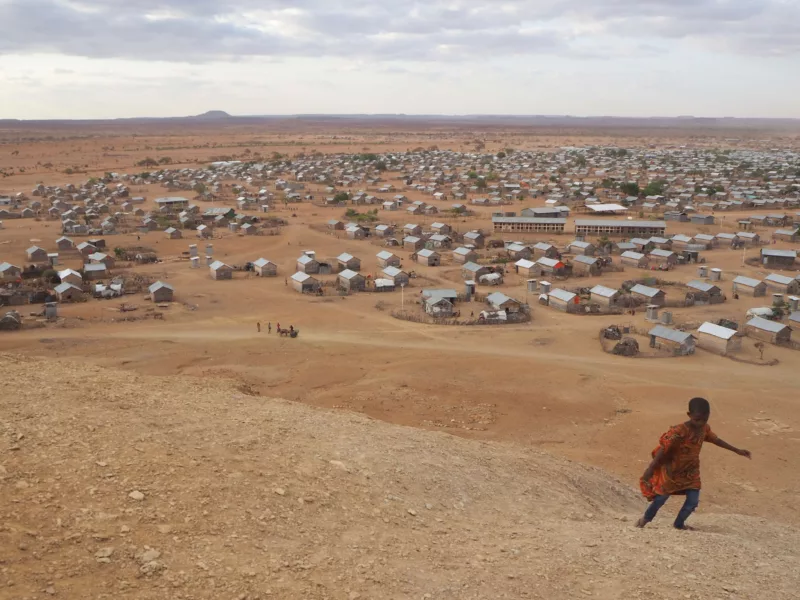
Photo Camps
In 2006, International Medical Corps and National Geographic began teaming up on a groundbreaking photographic and mental health program aimed at giving voice to refugee and displaced children who had fled areas of conflict in a number of countries, including the Democratic Republic of Congo, Iraq, Palestine, Somalia, Sudan and Uganda.
These vulnerable youth all had witnessed violence; many had lost one or both parents. The program enabled these children to tell their own stories in their own words, and share their powerful experiences with the wider world.
During these projects, students learn the basic art and skill of photography, then go out and photograph their lives, homes, families and communities. They and their classmates then work with world-renowned photographers and mental health experts to discuss the images they’ve captured and share their stories. The results are beautiful, haunting and inspiring pictures and words through which these children express themselves—and provide others with a deeper understanding of how conflict and displacement affect young people.
At the completion of the workshops, the students receive diplomas, and their selected images are displayed for the community and their families. It is a profound experience for these children, many of whom are unable to attend school. We also donate cameras and computers to their communities, enabling these therapeutic, educational and often income-generating activities to continue for years to come.
Our latest Photo Camp took place in an Ethiopian refugee camp located on the country’s border with Somalia. You can read more about the program, and see images captured by the students, below.
In addition, International Medical Corps Global Ambassador Lily Donaldson has published a book titled Melkadida that highlights the students’ images and their stories in their own words. Send an email if you’d like to find out more about the book.
Melkadida Photo Camp, 2019































Kadija Mohamud, 15
Nimo Omar, 16
Sowda Omar, 18
Kadija Mohamud , 15
Kadija Mohamud, 15
Jelle Ali, 17
Jelle Ali, 17
Ubah Wajib, 12
Salma Mohamed, 14
Zahra Mohammed, 11
Hibo Abdikadir, 18
Maryan Adan, 15
Ubah Wajib, 12
Salma Mohamed, 14
Hasan Adan, 18
Jelle Ali, 17
Ubah Wajib, 12
Salad Adan, 18
Warsame Adan, 17
Ubah Wajib, 12
Abdirashid Aydid, 18
Kadija Mohamud, 15
Hasan Adan, 18
Bishar Isack, 18
Ikra Omar, 17
Wanag Ali, 17
Hibo Abdikadir, 18
Kadija Mohamud, 15
Nimo Omar, 16
Sowda Omar, 18
Zahra Dagale, 11
The years between childhood and adulthood are critical to learning, discovering and developing a sense of self. But in Melkadida refugee camp, located in the desert on the Ethiopia/Somalia border, young people have limited options or opportunities. Many families have spent the better part of a decade at the camp, where there are few places to go and little to do.
Some schooling is available to young refugees, but many cannot attend because of responsibilities at home or a lack of family resources. Children with physical, intellectual, or mental health and behavioral challenges often are kept home, viewed as difficult to accommodate, or because of family fears about bullying and stigmatization. This separation from peers can cause a young person to become isolated and create or exacerbate mental health issues at a foundational time in life. Interventions that promote positive mental health can have a profound positive impact on long-term individual and community outcomes.
This is why International Medical Corps has been at the camp since 2011, providing mental health and psychosocial support services, primary and reproductive healthcare, nutrition support, and water, sanitation, hygiene services.
In 2019, International Medical Corps and National Geographic teamed up once again as part of an ongoing global project to bring photography and mental health services to young refugees in Africa and the Middle East. Young people in Melkadida were given the opportunity to express themselves through the camera’s lens, sharing their experiences with their community—and a global audience.
As part of our efforts to share these images more widely, we currently have an exhibit at the United Nations headquarters in New York City that is running through November 27. If you’re interested, you can find out more about visiting UN exhibits, or about visiting the UN itself.
Finally, to learn more about Photo Camp and to meet some of the young photographers involved, please watch Picture: Hope, a short film about the camp.